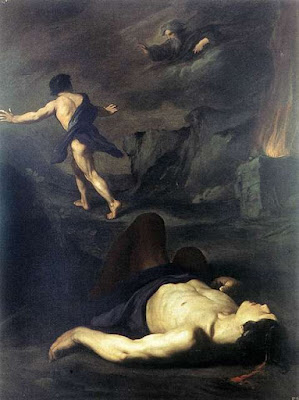The first book in the bible is Genesis, which means beginning. It starts at the beginning of creation and is filled with firsts. Today’s post takes a look at the first brothers, Cain and Abel, and more specifically at their sacrifices and the first murder when anger and jealousy consumed Cain when God rejected his offering but accepted Abel’s. If you do a cursory reading of the Genesis 4 account you might ask: Why did God reject Cain’s offering? I asked myself this question and did further study to find the answer.
Cain and Abel offerings
Cain and Able were the first sons born to Adam and Eve. In Genesis 4:2, we see that Abel was a “keeper of flocks,” and his brother was a “tiller of the ground.” In 4:3 Cain brings an offering of his first fruits and in verse 4, Abel brings the firstlings of his flock and their fat portions. So they both brought firsts. “And the LORD had regard for Abel and for his offering; but for Cain and for his offering He had no regard. So Cain became very angry and his countenance fell” (Gen. 4:4-5). I looked up the Hebrew meanings for the word offering in these two cases to see if there was a difference, but there was not. So why did God reject Cain’s offering?
Why was Cain's offering rejected?
To find the answer to this question, we need to dig deeper. Hebrews 11:4 sheds light on the answer. “By faith Abel offered to God a better sacrifice than Cain, through which he obtained the testimony that he was righteous, God testifying about his gifts, and through faith, though he is dead, he still speaks.” He still speaks? What is he saying?
His life/death is telling us the difference was and is a matter of faith. A heart issue. Pure faith produces works, but faith mixed with works is not a valid way to God. Faith secures the approval of God (Hebrews 11:1-2), and “without faith it is impossible to please Him, for he who comes to God must believe that He is and that He is a rewarder of those who seek Him” (Hebrews 11:6). In this regard, Abel is the first man of faith.
As part of the study, I looked up Cain and Abel’s names in the Hebrew. Cain’s name comes from qana, and means “to get.” Abel’s name means breath, which is associated with God’s Spirit in both the Old and New Testaments. This portends that Cain expected something in return for his offering.
What we can learn from Cain and Able offering?
The faith chapter in Hebrews was written to remind the Jewish people that salvation by faith is not something new. It proves it is something that goes all the way back to Abel. His offering was an exercise of his faith and thus a better sacrifice. God testified that this was evidence that he had been made righteous. Habakkuk 2:4 concurs that “The just shall live by faith.”
Bringing an offering to God was an act of worship. Genesis 4:2 says, “So it came about in the course of time that Cain brought an offering to the LORD of the fruit of the ground.” Course of time in the original language indicates the end of a day, time, or year. So the bringing of the offering was at a set time. This is why both men brought offerings. It wasn’t just some willy-nilly idea. God prescribed a specific time for them to come to the place where they would meet God and present their offerings. There was a place, time, and way to worship. Abel understood and obeyed. Cain tried it his way.
The same holds true for us today. “Therefore I urge you, brethren, by the mercies of God, to present your bodies a living and holy sacrifice, acceptable to God, which is your spiritual service of worship. And do not be conformed to this world, but be transformed by the renewing of your mind, so that you may prove what the will of God is, that which is good and acceptable and perfect” (Romans 12:1-2).
Why didn’t God accept Cain’s offering?
The account of Cain and Abel offers an illustration of salvation. Cain wanted to come to God on his own terms, doing things his way. Abel recognized he couldn’t come to God on his own, but needed to come God’s way. Cain’s way represents religious human achievement and works. Abel’s righteousness was through faith. God’s demands for holiness haven’t changed. Neither has the way we are to approach him.
* * * *
Written within the allegorical tradition of classics like Pilgrim's Progress, The Inheritance offers a symbolic fantasy adventure with a Christian message. Ideal discussion starter for youth groups, homeschoolers, and families.
Review copies available upon request in the comments below.



